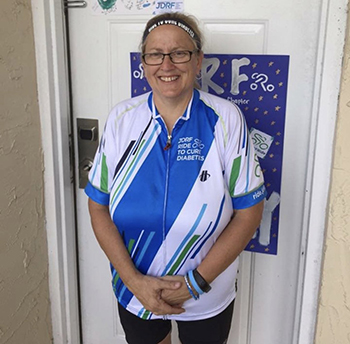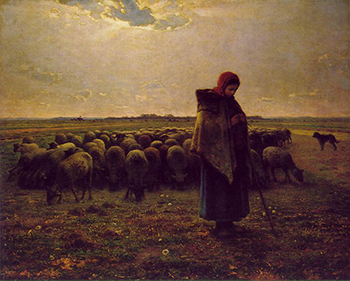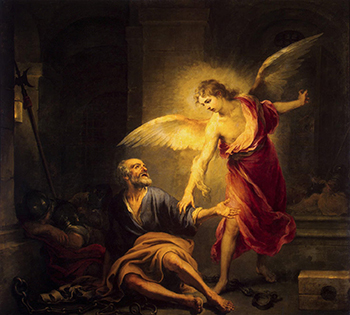From Our Archives
Debie Thomas, "The Woman at the Well" (2020); Dan Clendenin, "The Woman at the Well" (2017), "If You Hear His Voice" (2014).
For Sunday March 12, 2023
The Third Sunday in Lent
Lectionary Readings (Revised Common Lectionary, Year A)
Exodus 17:1-7
Romans 5:1-11
John 4:5-42
Psalm 95
This Week’s Essay
Michael Fitzpatrick is a lay teacher and preacher in The Episcopal Church. After growing up in the rural northwest, he served over five years in the U. S. Army as a Chaplain's Assistant, including two deployments to Iraq. After completing his military service, Michael has done graduate work in literature and philosophy. He is now finishing his PhD at Stanford University.
As a teacher, would I have the courage to protect my students from an active shooter should, God forbid, the situation ever arise? There have been more than 75 school shootings in the United States in the past twenty-five years. There were four this past February alone. Of the countless recent shootings, one in particular has really stayed with me.
On the 24th of October, 2022, a student of Central Visual and Performing Arts High School in St. Louis, MO opened fire on the upper floors, injuring students and leading others to jump from the higher stories while fleeing for their lives. After a tense standoff with city police, the shooter Orlando Harris was killed. In the wake of the shooting, 15-year-old sophomore Alexzandria Bell died from injuries, and a teacher on the verge of her retirement later died in the hospital. The teacher was Jean Kuczka, and she died because she put herself between the shooter and the other students.
 |
|
Jean Kuczka, teacher at Central Visual and Performing Arts High School in St. Louis, died protecting her students during the shooting at the school on 24 October 2022.
|
It’s in those moments of snap decision when our true character comes out. What have we trained ourselves to do when we don’t have time to think, only react? As much as my heart grieves for Bell and Kuczka, I also deeply admire Kuczka’s courage to lay down her life for the kids in her charge. Her sacrifice recalls Jesus’ teaching in John 10 about how the good shepherd lays down their life for the vulnerable sheep. Or Jesus’ lament to Jerusalem, “I have longed to gather your children together, as a hen gathers her chicks under her wing” (Matt. 23.27). The mother hen puts herself between her chicks and threats, and protects them even at the risk to her own body and life.
Several kids are alive today because of Jean Kuczka’s quick-thinking bravery. Acts of sacrifice save lives. Could I do for my students what Kuczka did last October? Every day I try to practice the discipline that would prepare me should such a moment ever arise. But there is a dimension of this question that I can answer without hesitation: do I think my students are worth dying for? Absolutely. No lack in my resolve. They are beautiful, precocious, and unadulterated young minds excited to begin exploring the world. They are the innocent. I would be honored to place my hen’s wing between them and those who would do them harm.
 |
|
Shepherdess with her Flock, oil-on-canvas painting by Jean-François Millet, 1864.
|
O how scripture truly interrogates our hearts! The story of Jean Kuczka is exactly the kind of story St. Paul is thinking of in our epistle reading when he writes, “Rarely will anyone die for a righteous person — though perhaps for a good person someone might actually dare to do this.” St. Paul is speaking honestly here; as much as I’d like to think of myself as someone who’d offer up my life for anyone who needed it, that’s probably more fantasy than reality. In truth, we all secretly measure the value of each other’s lives, and we don’t count all lives as equal. Certainly we would say of our school children that they are worth dying for. We would die for those we think are innocent, righteous, good. But we don’t ascribe to everyone these adjectives.
Which leads to the kicker, “But God proves his love for us in that while we were still sinners Christ died for us.” Here’s how I translate that for myself today. I’ve been wrestling with whether I could give my life for my students as Jean Kuczka did in an active shooter situation. But what if I were asked to put myself between Orlando Harris and the responding police to save his life, the life of the shooter? Would any of us lay down our lives to save him?
Not so easy to answer now. If we’re honest, we’re not sure that he’s worth saving. Shouldn’t the police gun him down for his actions? Don’t some people have it coming to them?
Yet this is exactly how St. Paul describes God’s love. The Most High loves his creation so much, he doesn’t just save the people that consensus says are worth saving; he saves those deemed unworthy of saving. “For while we were still vulnerable,” St. Paul writes, “At just the right time Christ died for the ungodly.” Jesus goes to the Cross for those judged not worth saving, the very people we’d never sacrifice our own lives for. To recall a Paul Tillich quote I’ve used in past essays, “While we were still unacceptable, Christ accepted us.” A good person like Jean Kuczka might die to save the righteous. But only Christ dies to save the unrighteous.
 |
|
Liberation of Peter, oil on canvas painting by Bartolomé Esteban Murillo, 1667.
|
For some of us, these verses have been used in a hurtful way, to make us feel guilty for Christ having to die for us, or to emphasize our lack of self-worth. But that is not what St. Paul is trying to do here at all. To the contrary, this reading is a declaration of profound hope, for St. Paul affirms that there is nothing we can do to exclude ourselves from the love of God. St. Paul affirms the unlimited scope of the Liberator’s saving act, “For if while we were enemies, we were reconciled to God through the death of his Son, much more surely, having been reconciled, will we be saved by his life.” If the Holy One saved us through death even when we were enemies, how much more are we liberated as God’s friends through the resurrected life of Jesus!
Which highlights the final thought latent in St. Paul’s message. We have peace with God through our Lord Jesus Christ, and as such our Creator says to us, “You are accepted.” But not as we are. We are transformed, changed from enemies into friends, from the unrighteous into righteousness, from nobodies into somebodies. As the recent global commentary bible study on 1 Peter for the Lambeth Conference puts it,
God calls us out of darkness into light, turning nobodies into a nation, bestowing divine forgiveness on the unforgiven. The entire act of God described here constitutes the life, passion, death and resurrection of Jesus, the self-giving of God for sinful human beings, that takes them with him to his own glory. Holiness, then, is supremely manifest in God coming close to the unholy, patiently submitting to what is unholy, and thereby transforming it to God’s own character of self-sacrificing love. (The First Letter of Peter: A Global Commentary).
At the right time, Christ accepted the unacceptable, and thereby made us acceptable. While we were still sinners, God loved us. Our hope does not disappoint, because God’s love has been poured into our hearts through the Holy Spirit that has been given to us. Christ died for us because acts of sacrifice save lives. Just ask the students of Jean Kuczka, may she rest in peace.
A Prayer
George MacDonald (1824–1905)
ALL sights and sounds of day and year,
All groups and forms, each leaf and gem,
Are thine, O God, nor will I fear
To talk to Thee of them.
Too great Thy heart is to despise,
Whose day girds centuries about;
From things which we name small, Thine eyes
See great things looking out.
Therefore the prayerful song I sing
May come to Thee in ordered words:
Though lowly born, it needs not cling
In terror to its chords.
I think that nothing made is lost;
That not a moon has ever shone,
That not a cloud my eyes hath crossed
But to my soul is gone.
That all the lost years garnered lie
In this Thy casket, my dim soul;
And Thou wilt, once, the key apply,
And show the shining whole.
But were they dead in me, they live
In Thee, Whose Parable is — Time,
And Worlds, and Forms — all things that give
Me thoughts, and this my rime.
Father, in joy our knees we bow:
This earth is not a place of tombs:
We are but in the nursery now;
They in the upper rooms.
For are we not at home in Thee,
And all this world a visioned show;
That, knowing what Abroad is, we
What Home is too may know?George MacDonald was a Scottish author, poet and Christian Congregational minister. He became a pioneering figure in the field of modern fantasy literature and the mentor of fellow-writer Lewis Carroll. In addition to his fairy tales, MacDonald wrote several works of Christian theology, including several collections of sermons. C. S. Lewis wrote that he regarded MacDonald as his "master": "Picking up a copy of Phantastes one day at a train-station bookstall, I began to read. A few hours later, I knew that I had crossed a great frontier." G. K. Chesterton cited The Princess and the Goblin as a book that had "made a difference to my whole existence". Even Mark Twain, who initially disliked MacDonald, became friends with him, and there is some evidence that Twain was influenced by him. The Christian author Oswald Chambers wrote in his Christian Disciplines that "it is a striking indication of the trend and shallowness of the modern reading public that George MacDonald's books have been so neglected". — Adapted from Wikipedia
Michael Fitzpatrick welcomes comments and questions via m.c.fitzpatrick@outlook.com
Image credits: (1) Twitter; (2) Wikimedia.org; and (3) Wikimedia.org.





